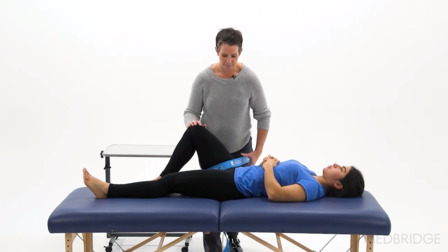A Primer on Examination and Treatment Metrics
Presented by Eric Hegedus
12-Month Subscription
Unlimited access to:
- Thousands of CE Courses
- Patient Education
- Home Exercise Program
- And more
Non-Financial: Eric Hegedis cites his research in this course, but does not use the course for the purpose of promoting his own research.
In this course, learners will be introduced to the Pain and Disability Drivers Management model and gain a greater understanding of the metrics that govern the examination and treatment processes. The examination process is based fundamentally on an understanding of epidemiology and measures such as prevalence and incidence. Examination metrics include measures like sensitivity, specificity, and likelihood ratios, applied with the goal of modifying pretest probability to get closer to some diagnosis (ruling in) and further away from others (ruling out). The goal of intervention is to produce superior patient outcomes. This course will provide a brief overview of outcome measures and discuss common treatment metrics, including p-value, effect size, and number needed to treat. In addition, prognostic factors will be discussed as they relate to outcomes and important measures like the minimal detectable change. This course is part of a comprehensive clinical series covering examination and intervention for the cervical, thoracic, and lumbar spine, as well as the upper (shoulder, elbow, wrist, and hand) and lower (hip, pelvis, knee, foot, and ankle) quarters.
Meet your instructor

Eric Hegedus
Dr. Eric J. Hegedus has had a notable 21-year career as a leader and innovator in physical therapist education, research, and clinical practice and is founding chair of the Doctor of Physical Therapy Department at High Point University. Dr. Hegedus also is founder and director of Targeted Enhanced Athletic Movement (TEAM), a…
Chapters & learning objectives

1. Orthopedic Excellence Series Introduction
In this chapter, learners will be introduced to the Orthopedic Excellence Series and the constructs of this series, including the Pain and Disability Drivers Management model. Learners will become familiar with common epidemiological terms and statistics that govern diagnostic accuracy and their clinical application.

2. Helpful Epidemiological Terms
In this chapter, learners will be introduced to terms that are helpful to understand when contemplating valuable information from a patient history, like incidence, prevalence, risk, and prognosis.

3. Screening and Diagnosis
In this chapter, learners will gain a greater understanding of the language of diagnosis and explore the importance of screening, diagnostic accuracy, and quality of diagnostic accuracy studies.

4. Measuring Outcomes and Treatment Effects
In this chapter, learners will become familiar with the categories of outcome measures and the importance of these measures in performing a thorough patient interview as well as an assessment of treatment effect. Statistics such as minimal detectable change, measures of effect, and floor/ceiling effects will be discussed.
More courses in this series

Crucial Factors Influencing Health & Recovery in Musculoskeletal Care
Chad Cook

Evidence-Based Examination of the Cervical Spine: An Update
Chad Cook

Evidence-Based Treatment of the Cervical Spine: An Update
Chad Cook

Cervical Spine Examination and Treatment: Cases to Synthesize Learning
Chad Cook

Evidence-Based Examination of the Thoracic Spine: An Update
Chad Cook

Evidence-Based Treatment of the Thoracic Spine: An Update
Chad Cook

Thoracic Spine Examination and Treatment: Cases to Synthesize Learning
Chad Cook

Evidence-Based Examination of the Lumbar Spine: An Update
Chad Cook

Evidence-Based Treatment of the Lumbar Spine: An Update
Chad Cook

Lumbar Spine Examination and Treatment: Cases to Synthesize Learning
Chad Cook

Evidence-Based Examination of the Elbow, Wrist, and Hand: An Update
Chad Cook

Evidence-Based Treatment of the Elbow, Wrist, and Hand: An Update
Chad Cook

Elbow, Wrist, and Hand Examination and Treatment: Cases to Synthesize Learning
Chad Cook

A Primer on Exercise and Treatment Prescription
Alexis Wright

Evidence-Based Examination of the Hip: An Update
Alexis Wright

Evidence-Based Treatment of the Hip: An Update
Alexis Wright

Hip Examination and Treatment: Cases to Synthesize Learning
Alexis Wright

Evidence-Based Examination of the Foot and Ankle: An Update
Alexis Wright

Evidence-Based Treatment of the Foot and Ankle: An Update
Alexis Wright

Foot and Ankle Examination and Treatment: Cases to Synthesize Learning
Alexis Wright

Evidence-Based Examination of the SIJ/Pelvis
Alexis Wright

Evidence-Based Treatment of the SIJ/Pelvis
Alexis Wright

A Primer on Examination and Treatment Metrics
Eric Hegedus

Evidence-Based Examination of the Shoulder: An Update
Eric Hegedus

Special Tests of the Shoulder
Eric Hegedus

Evidence-Based Treatment of the Shoulder: An Update
Eric Hegedus

Management of the Shoulder: Case-Based Vignettes
Eric Hegedus

Evidence-Based Examination of the Knee and Thigh: An Update
Eric Hegedus

Special Tests of the Knee
Eric Hegedus

Evidence-Based Treatment of the Knee and Thigh: An Update
Eric Hegedus

Management of the Knee and Thigh: Case-Based Vignettes
Eric Hegedus